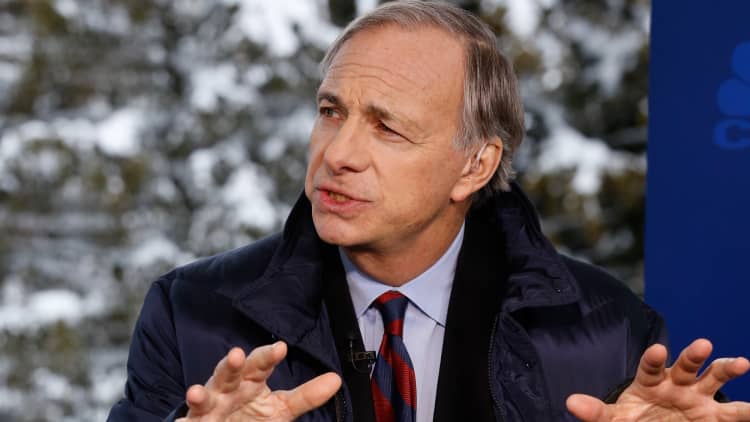Many economists are predicting that the ongoing economic disruptions and business shutdowns caused by the coronavirus pandemic will result in a global recession. But billionaire investor Ray Dalio is going one step further by predicting a depression.
Dalio — who runs the world's largest hedge fund, Bridgewater Associates — sees the coming economic downturn as resembling the effects of the Great Depression, which lasted from 1929 to 1933 and is regarded as the worst economic crisis in American history. The Great Depression saw U.S. unemployment hit a peak of nearly 25%, while gross domestic product (GDP) declined by nearly 30%.
"Do I think we're in that? Yes," Dalio said when asked about the prospect of a modern depression in a video interview on Wednesday with the "Ted Connects" program, part of the Ted talks platform. The hedge fund billionaire pointed to the likelihood that the U.S. will see a "double-digit unemployment rate" and more than 10% decline in the economy, with effects potentially lasting years rather than months.
A recession sees an economy's production, reflected in its GDP, decline for multiple quarters in a row, with effects lasting several months. In a depression, though, the effects typically last for a few years.
"I think you could look at this like a tsunami that's hit — the virus itself and the social distancing — and then what are the consequences in terms of the wreckage [from that]," Dalio said in the interview. He sees the "wreckage" as the long-term effects on businesses' balance sheets and individuals' incomes that are taking "tremendous" hits in cases where workers have been laid off.
While we still don't know exactly what the long-term effects of the coronavirus pandemic will be on the global economy, roughly 16 million Americans (about 10% of the overall workforce) have already filed for unemployment benefits in recent weeks. And Goldman Sachs has predicted that U.S. unemployment could hit 15% by this summer, while the financial giant is also bracing for a GDP decline of 34% in the second quarter of 2020.

Dalio previously told CNBC's "Squawk Box" last month that he expects U.S. corporate losses to climb up to $4 trillion, and he added that "a lot of people are going to be broke" as a result of the downturn. He's also estimated that global losses could be anywhere from $12 trillion to $20 trillion from a global economy that's worth over $85 trillion.
"This is bigger than what happened in 2008," Dalio said in the interview, referring to the 2008 financial crisis, and the Great Recession that followed, in which the U.S. GDP fell 4.3% and the unemployment rate climbed to 10%.
In 2008, the financial crisis stemmed from the collapse of the U.S. housing market and a rash of bankruptcies of financial institutions that were highly leveraged with massive debt, Dalio noted. As a result, the government stepped in with a $700 billion bailout to keep those industries from failing, which could have created a domino effect on the rest of the economy.
In this case, though, it's not just banks or one industry in particular that are in trouble, as there are millions of small and large businesses across the country that are shuttered and piling up debt.
"This is more complex than [2008], because there are the banks and then there are all of those that are beyond banks. All of the little businesses, all of those in all the different places that are beyond it," Dalio said.
Dalio also echoed previous statements to CNBC, in which he noted that U.S. monetary policy is different today than it was in 2008, when the U.S. federal reserve was able to significantly lower interest rates as part of a broader effort to boost the failing economy.
Today, though, federal interest rates were already relatively low before the coronavirus pandemic, which Dalio says creates an "inability of central banks to stimulate in a way that's normal," the investor told "Squawk Box" in March.
"We are now at a point where there will have to be a debt restructuring and a monetization of that," Dalio said last month. "We're living in a different world, like the 1930s … in which you have a devaluation of the dollar. You have the printing of money."
Dalio believes it will take "creativity" and "inventiveness" to rebuild the economy — both in terms of the government's actions to boost the economy as well as the need for entrepreneurs "who can adapt well and innovate well" to succeed in a difficult economic environment.
That being said, Dalio believes it will take "a long time" for the economy to return to the heights it enjoyed before the current pandemic, though he does not yet have a specific timeline.
Dalio is not alone in bracing for the worst at the moment, as Democratic presidential candidate Joe Biden told CNN that the economic recovery from this pandemic could be the "biggest challenge in modern history" and that it could "eclipse" what the country faced during the Great Depression. (Of course, President Donald Trump no longer being able to cite a strong economy as his top selling point could benefit Biden if he secures the Democratic nomination for president.)
However, other experts believe this financial crisis is unique because it is a result of a health issue, a global pandemic, rather than an otherwise unstable or unproductive economy.
As such, they are more optimistic that the economy will rebound quickly once the coronavirus pandemic subsides.
"I would point to the difference between this and a normal recession: There is nothing fundamentally wrong with our economy," Federal Reserve Chairman Jerome Powell told NBC's "Today" in an interview last month.
In a follow-up interview with CNBC on Thursday, Powell reiterated his belief that the U.S. economy can have a "robust" rebound once the pandemic ends, though he is reluctant to offer a precise timetable for how long that could take.
"When the virus does run its course and it's safe to go back to work and it's safe for businesses to open, then we would expect there to be a fairly quick rebound," Powell told CNBC. "I think most people expect that to happen in the second half of this year after the second quarter. To try to be precise about where that will be, I don't think that would be appropriate."
Check out: The best credit cards of 2020 could earn you over $1,000 in 5 years
Don't miss:
How America's capitalist system is 'broken,' according to billionaire financier Ray Dalio
Like this story? Subscribe to CNBC Make It on YouTube!


